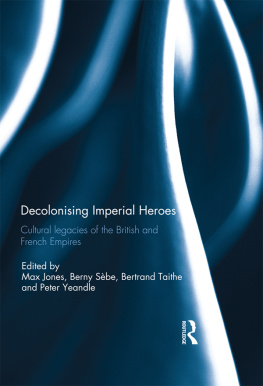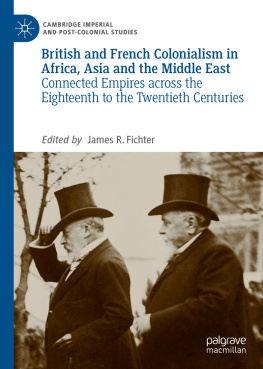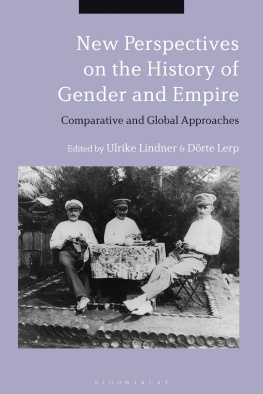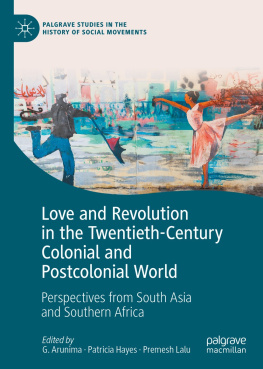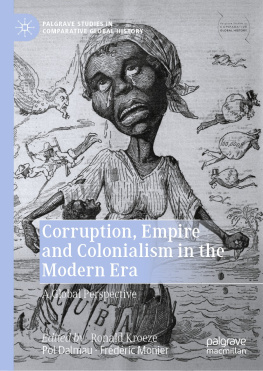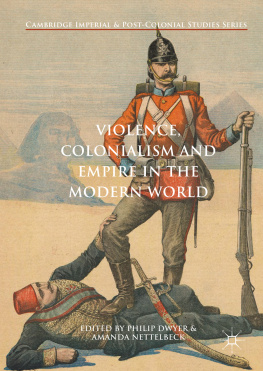
Frontispiece: So Nicolau Camp (Angola). Political Prisioneers being released (May 1974). Unknown photographer. Image courtesy of IANTT.
Source: Arquivo Nacional da Torre do Tombo, IANTT (Portugal), Edifcio da Torre do Tombo, Alameda da Universidade, 1649-010 Lisbon, Portugal
Source reference: Secretariado Nacional de Informao, Arquivo Fotogrfico, Documental, XX-2, doc. 35348 PT/TT/SNI/ARQF/RP/003/53694
Empires and Colonial Incarceration in the Twentieth Century
This book engages with a controversial issue, namely the establishment of penal colonies and concentration camps in imperial spaces, which have informed ongoing debates on the repressive practices of colonial rule and popular resistance against it. The contributors offer a reassessment of the history of politically motivated incarceration based upon a multi-disciplinary perspective in a global, imperial setting during the twentieth century.
The introduction and seven chapters engage with comparative and transnational perspectives on political persecution, forced confinement and colonial rule in British, French, German, Belgian and Portuguese dominions in Africa, Asia, Oceania and Latin America. Addressing political incarcerations global imperial dimensions, they focus upon the organisation, strategies, narratives and practices associated with political internment in Africa (Angola, Tanzania, Rhodesia, South Africa), Latin America (French Guyana) and the Pacific region (New Caledonia). Penal legislation, policies of convict transport and political imprisonment, resettlement, prison regimes, resistance and liberation struggles, counter insurgency, prisoner agency, and prisons as cultural spaces and of memory are discussed here for different time periods from the mid-1800s to the late twentieth century. The chapters build upon the ongoing debate on political incarceration in the empire and the remarkable dynamic scientific research witnessed over the last decades. As a result, they provide novel insights into the nature of legal systems, colonial discourse, memory, racial segregation and persecution, prisoners narratives of practices of punishment and incarceration, and human rights abuses in imperial spaces.
The chapters in this book were originally published as a special issue of The Journal of Imperial and Commonwealth History. The editors have also written an original conclusion to the present volume.
Philip J. Havik (PhD Social Sciences, Leiden University, NL) is Senior Researcher at the Instituto de Hygiene and Tropical Medicine (IHMT) of the Universidade NOVA in Lisbon, Portugal, while also teaching at the same institution. His research engages with global health, public health, anthropology of health, history of tropical medicine and the colonial and post-colonial development of Lusophone African countries.
Helena Pinto Janeiro (PhD in Contemporary History) is a historian at the Diplomatic Institute of the Ministry of Foreign Affairs of Portugal and a researcher at the Institute of Contemporary History (IHC) of the Universidade NOVA in Lisbon. Her current research centres on the World Wars and the League of Nations; memorial museums and transitional justice; archives and oral history; and political prisons and camps.
Pedro Aires Oliveira (PhD in Contemporary History) is Associate Professor at the School of Social Sciences and Humanities of the Universidade NOVA in Lisbon, Portugal, and an integrated researcher at the Institute of Contemporary History. He has authored, co-authored and edited several books on Portuguese foreign relations and overseas/imperial history, and has contributed to several international peer-review journals.
Irene Flunser Pimentel (PhD Institutional History and Contemporary Politics) is a researcher at the Institute of Contemporary History of the Universidade NOVA in Lisbon, Portugal. She has (co-) authored several books on the Portuguese Political Police (PIDE/DGS), the Portuguese New State Dictatorship, Womens Organizations and Portugal during the Second World War.
First published 2022
by Routledge
2 Park Square, Milton Park, Abingdon, Oxon, OX14 4RN
and by Routledge
605 Third Avenue, New York, NY 10158
Routledge is an imprint of the Taylor & Francis Group, an informa business
2022 Taylor & Francis
All rights reserved. No part of this book may be reprinted or reproduced or utilised in any form or by any electronic, mechanical, or other means, now known or hereafter invented, including photocopying and recording, or in any information storage or retrieval system, without permission in writing from the publishers.
Trademark notice: Product or corporate names may be trademarks or registered trademarks, and are used only for identification and explanation without intent to infringe.
British Library Cataloguing-in-Publication Data
A catalogue record for this book is available from the British Library
ISBN13: 978-1-032-00272-9 (hbk)
ISBN13: 978-1-032-00273-6 (pbk)
ISBN13: 978-1-003-17344-1 (ebk)
DOI: 10.4324/9781003173441
Typeset in Minion Pro
by codeMantra
Publishers Note
The publisher accepts responsibility for any inconsistencies that may have arisen during the conversion of this book from journal articles to book chapters, namely the inclusion of journal terminology.
Disclaimer
Every effort has been made to contact copyright holders for their permission to reprint material in this book. The publishers would be grateful to hear from any copyright holder who is not here acknowledged and will undertake to rectify any errors or omissions in future editions of this book.
Philip J. Havik, Helena Pinto Janeiro, Pedro Aires Oliveira and Irene Pimentel
ABSTRACT
The international conference held in Lisbon, Portugal in 2016 on Colonial Incarceration in the Twentieth Century: a comparative approach, provided a platform to engage with ongoing debate on political persecution, confinement and colonial rule in empire. The present papers which resulted from the above-mentioned conference provide valuable insights into recent research on politically motivated punishment and internment in several colonial contexts. Mainly concerned with Africa, they focus on the organisation, discourse and practice regarding political internment in Portuguese, German, British and French empires with reference to Angola, Tanzania, Rhodesia, South Africa, as well as Guyana and New Caledonia. The papers engage with the historiography of political incarceration in prisons and detention camps during the colonial period, from the late nineteenth century to the end of empire, while building upon the remarkable dynamic in scientific research over the last decades. Penal legislation, policies of convict transport and political imprisonment, resettlement, prison regimes, resistance and liberation struggles, counter insurgency, prisoner agency, prisons as cultural spaces and memory are discussed here in different time periods and locations from a variety of multidisciplinary angles.
Research on the history of penal legislation, law and order, and prison systems in colonial situations with regard to different regions and continents has been increasingly forthcoming over the last decades (e.g. ; Harper 2001; Anderson 2005; Pierce and Rao 2006; Brown and Diktter 2007; Sherman 2009; Gibson 2011). The study of colonial contexts in British, French and Italian empires has unearthed the extensive use of prison camps in Africa, Asia and the Pacific region in empire for the incarceration of (suspected) members of political dissenters and opposition groups, persecuted in metropolitan and colonial contexts, or for enemy combatants in the context of colonial warfare (Arnold 1997; Zinoman 2000; LeSueur 2001; Toth 2006; Brown 2010; Brown 2014; Scheipers 2015; Anderson 2016b). The transport and internment of convict labour to and between colonies constituted one of the darker hallmarks of empire, which with time became a tool for the criminalisation and the forced exile of regimes perceived political opponents (e.g. Bullard 2000; Machava 2011; Anderson and Maxwell-Stewart 2013; Coates 2013; Thnault 2015; Hynd 2015b; Anderson 2016b). One of the first readers to take stock of the use of incarceration in colonial and post-colonial literature (Harper 2001) showed to what extent penal narratives built upon the functional traces that Foucault had identified in his study on the history of imprisonment in Europe (Foucault 1975). However, at the same time, the aforesaid reader also recognised and exposed the limits and shortcomings of such approaches, above all with regard to the study of non-Western social, economic, political and cultural spaces, and the need for reconsidering these narratives in local and regional settings elsewhere.



